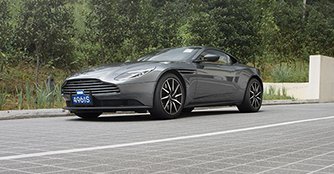Aston Martin DB11 4.0 V8 (A) Review
18 Apr 2018|21,989 views
What We Like
Sharper and more direct handling
Looks fabulous
4.0-litre V8 engine still delivers tons of power
Boisterous soundtrack
Undeniable desirability
What We Dislike
Not as exotic or intense sounding as the V12
Ever since the Aston Martin DB5 appeared in the James Bond film Goldfinger, Aston Martin and exotica have always gone hand in hand. And let's be honest, just looking at or hearing an Aston go by invokes a particular sense of pure emotionality. And as far as engines go, the V12 engine has always been the most exotic of them all.
Now, the brand's flagship DB11 model adds a turbocharged V8 variant to the stable, alongside the V12. Heresy, I hear you say? Perhaps, but there might be a good reason for it.
Is a V8 powerful enough?
Come on now. The V12 engine develops 600bhp and 700Nm of torque. This 4.0-litre V8 engine develops 503bhp and 675Nm of torque. In which conceivable universe is that not enough power?
In real driving conditions, this car feels no slower than its big brother. Power comes immediately and immensely, warping you from point A to point B in no time at all. 0-100km/h takes just four seconds, which is just 0.1 seconds slower than the V12.
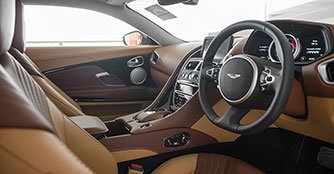
 The cabin oozes luxury and sophistication, courtesy of generous use of leather and intricate craftsmanship
The cabin oozes luxury and sophistication, courtesy of generous use of leather and intricate craftsmanship
We reckon that in just about every driving situation, the V8 feels just as fast, if only because it's able to put down its power better than the V12.
Lighter is better?
The most noticeable difference between the V8 and the V12 is the weight differential. The V8 engine, lighter and more compact than the V12, contributes to a 115kg weight saving. Engineers have also developed new engine mounts and a slimline wet sump system that allows the engine to be mounted lower, optimising the car's centre of gravity.
As such, the weight distribution has been changed from 51/49 (front/rear) to 49/51. The electric power steering has also been retuned, and the rolls bars and rear suspension bushings made harder.
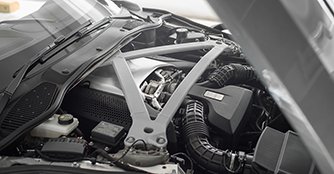
 The 4.0-litre engine delivers 503bhp and 675Nm of torque, which is still more power than anyone actually needs
The 4.0-litre engine delivers 503bhp and 675Nm of torque, which is still more power than anyone actually needs
What all that technical mumbo jumbo means is that this DB11 has a distinct dynamic difference from the V12. Because the front end is lighter, turn-in feels much sharper and more immediate. This DB11 is undoubtedly better and more engaging to drive.
Attacking corners in the DB11 V8 feels more engaging and exciting, with a better sense of grip and confidence. The V12 is very much a grand tourer - long-legged and ridiculously quick in a straight line, but it lacks the nimbleness that the V8 possesses. The V8 definitely feels sharper and sportier, though it's still no full-blown sports car.
Now, the brand's flagship DB11 model adds a turbocharged V8 variant to the stable, alongside the V12. Heresy, I hear you say? Perhaps, but there might be a good reason for it.
Is a V8 powerful enough?
Come on now. The V12 engine develops 600bhp and 700Nm of torque. This 4.0-litre V8 engine develops 503bhp and 675Nm of torque. In which conceivable universe is that not enough power?
In real driving conditions, this car feels no slower than its big brother. Power comes immediately and immensely, warping you from point A to point B in no time at all. 0-100km/h takes just four seconds, which is just 0.1 seconds slower than the V12.

We reckon that in just about every driving situation, the V8 feels just as fast, if only because it's able to put down its power better than the V12.
Lighter is better?
The most noticeable difference between the V8 and the V12 is the weight differential. The V8 engine, lighter and more compact than the V12, contributes to a 115kg weight saving. Engineers have also developed new engine mounts and a slimline wet sump system that allows the engine to be mounted lower, optimising the car's centre of gravity.
As such, the weight distribution has been changed from 51/49 (front/rear) to 49/51. The electric power steering has also been retuned, and the rolls bars and rear suspension bushings made harder.

What all that technical mumbo jumbo means is that this DB11 has a distinct dynamic difference from the V12. Because the front end is lighter, turn-in feels much sharper and more immediate. This DB11 is undoubtedly better and more engaging to drive.
Attacking corners in the DB11 V8 feels more engaging and exciting, with a better sense of grip and confidence. The V12 is very much a grand tourer - long-legged and ridiculously quick in a straight line, but it lacks the nimbleness that the V8 possesses. The V8 definitely feels sharper and sportier, though it's still no full-blown sports car.
Is it enjoyable to drive?
Certainly. The ride in the DB11 V8 is surprisingly supple, especially in the softest suspension setting. It soaks up bumps nicely, and the car never feels overly intimidating or harsh. Even in the stiffest suspension setting, the ride quality is still very acceptable.
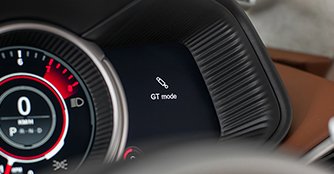
 In GT mode, the suspension offers great suppleness, perfect for everyday driving and long-distance cruising
In GT mode, the suspension offers great suppleness, perfect for everyday driving and long-distance cruising
It sounds the part too. It's no exotic V12, but it has its own character. Yes, it is an AMG-sourced engine, and shares aural similarities to the AMG V8s, but this engine has its own sound. Deeper, more sonorous, less savage sounding than the equivalent AMG V8.
Issues? Well, at low speeds the brakes do feel quite snatchy and lacks clean modulation. However, get up to some speed and that goes away.
There are other minor differences between the two - the V8 has two hood louvers compared to the four on the V12, and the head lights are trimmed in black instead of silver. Other than that, the two variants are visually identical, inside and out.
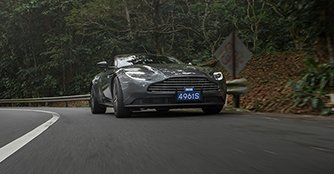
 In corners, the V8 feels sharper and more agile, thanks to a lighter engine and optimised weight distribution
In corners, the V8 feels sharper and more agile, thanks to a lighter engine and optimised weight distribution
Who's buying this car?
Well, it sounds almost crazy to say it, but the V8 will appeal to the more cost-conscious buyer. It's cheaper to buy and cheaper to run. But that shouldn't be the only reason you should choose this over the V12.
In truth, the two variants are very similar, but have subtle character differences that set them apart. The V12 certainly is the more exotic car - it sounds better, the engine pulls more smoothly and, of course, it's the range-topping model.
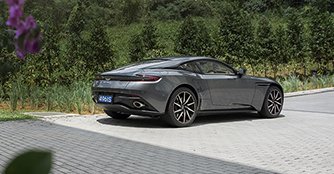
 The DB11 V8 has a subtle but distinct character difference from the V12, with a clear focus on added sharpness and dynamism
The DB11 V8 has a subtle but distinct character difference from the V12, with a clear focus on added sharpness and dynamism
The V8, while still sounding good and pulls amply, is the more dynamic car to drive. The balance is better, it turns in sharper, and feels slightly more engaging to drive. If anything, you could make the case that Aston has spent the time to develop and refine the DB11 into a better car, at least dynamically.
Of course, this is all nitpicking. It's still an Aston Martin and it's still a DB11. No matter the engine, an Aston Martin is, and always will be, extremely desirable. Having to scratch your head about buying one over another is really just the epitome of rich men problems.
Certainly. The ride in the DB11 V8 is surprisingly supple, especially in the softest suspension setting. It soaks up bumps nicely, and the car never feels overly intimidating or harsh. Even in the stiffest suspension setting, the ride quality is still very acceptable.

It sounds the part too. It's no exotic V12, but it has its own character. Yes, it is an AMG-sourced engine, and shares aural similarities to the AMG V8s, but this engine has its own sound. Deeper, more sonorous, less savage sounding than the equivalent AMG V8.
Issues? Well, at low speeds the brakes do feel quite snatchy and lacks clean modulation. However, get up to some speed and that goes away.
There are other minor differences between the two - the V8 has two hood louvers compared to the four on the V12, and the head lights are trimmed in black instead of silver. Other than that, the two variants are visually identical, inside and out.

Who's buying this car?
Well, it sounds almost crazy to say it, but the V8 will appeal to the more cost-conscious buyer. It's cheaper to buy and cheaper to run. But that shouldn't be the only reason you should choose this over the V12.
In truth, the two variants are very similar, but have subtle character differences that set them apart. The V12 certainly is the more exotic car - it sounds better, the engine pulls more smoothly and, of course, it's the range-topping model.

The V8, while still sounding good and pulls amply, is the more dynamic car to drive. The balance is better, it turns in sharper, and feels slightly more engaging to drive. If anything, you could make the case that Aston has spent the time to develop and refine the DB11 into a better car, at least dynamically.
Of course, this is all nitpicking. It's still an Aston Martin and it's still a DB11. No matter the engine, an Aston Martin is, and always will be, extremely desirable. Having to scratch your head about buying one over another is really just the epitome of rich men problems.
What We Like
Sharper and more direct handling
Looks fabulous
4.0-litre V8 engine still delivers tons of power
Boisterous soundtrack
Undeniable desirability
What We Dislike
Not as exotic or intense sounding as the V12
Ever since the Aston Martin DB5 appeared in the James Bond film Goldfinger, Aston Martin and exotica have always gone hand in hand. And let's be honest, just looking at or hearing an Aston go by invokes a particular sense of pure emotionality. And as far as engines go, the V12 engine has always been the most exotic of them all.
Now, the brand's flagship DB11 model adds a turbocharged V8 variant to the stable, alongside the V12. Heresy, I hear you say? Perhaps, but there might be a good reason for it.
Is a V8 powerful enough?
Come on now. The V12 engine develops 600bhp and 700Nm of torque. This 4.0-litre V8 engine develops 503bhp and 675Nm of torque. In which conceivable universe is that not enough power?
In real driving conditions, this car feels no slower than its big brother. Power comes immediately and immensely, warping you from point A to point B in no time at all. 0-100km/h takes just four seconds, which is just 0.1 seconds slower than the V12.

 The cabin oozes luxury and sophistication, courtesy of generous use of leather and intricate craftsmanshipWe reckon that in just about every driving situation, the V8 feels just as fast, if only because it's able to put down its power better than the V12.
The cabin oozes luxury and sophistication, courtesy of generous use of leather and intricate craftsmanshipWe reckon that in just about every driving situation, the V8 feels just as fast, if only because it's able to put down its power better than the V12.
Lighter is better?
The most noticeable difference between the V8 and the V12 is the weight differential. The V8 engine, lighter and more compact than the V12, contributes to a 115kg weight saving. Engineers have also developed new engine mounts and a slimline wet sump system that allows the engine to be mounted lower, optimising the car's centre of gravity.
As such, the weight distribution has been changed from 51/49 (front/rear) to 49/51. The electric power steering has also been retuned, and the rolls bars and rear suspension bushings made harder.

 The 4.0-litre engine delivers 503bhp and 675Nm of torque, which is still more power than anyone actually needsWhat all that technical mumbo jumbo means is that this DB11 has a distinct dynamic difference from the V12. Because the front end is lighter, turn-in feels much sharper and more immediate. This DB11 is undoubtedly better and more engaging to drive.
The 4.0-litre engine delivers 503bhp and 675Nm of torque, which is still more power than anyone actually needsWhat all that technical mumbo jumbo means is that this DB11 has a distinct dynamic difference from the V12. Because the front end is lighter, turn-in feels much sharper and more immediate. This DB11 is undoubtedly better and more engaging to drive.
Attacking corners in the DB11 V8 feels more engaging and exciting, with a better sense of grip and confidence. The V12 is very much a grand tourer - long-legged and ridiculously quick in a straight line, but it lacks the nimbleness that the V8 possesses. The V8 definitely feels sharper and sportier, though it's still no full-blown sports car.
Now, the brand's flagship DB11 model adds a turbocharged V8 variant to the stable, alongside the V12. Heresy, I hear you say? Perhaps, but there might be a good reason for it.
Is a V8 powerful enough?
Come on now. The V12 engine develops 600bhp and 700Nm of torque. This 4.0-litre V8 engine develops 503bhp and 675Nm of torque. In which conceivable universe is that not enough power?
In real driving conditions, this car feels no slower than its big brother. Power comes immediately and immensely, warping you from point A to point B in no time at all. 0-100km/h takes just four seconds, which is just 0.1 seconds slower than the V12.

Lighter is better?
The most noticeable difference between the V8 and the V12 is the weight differential. The V8 engine, lighter and more compact than the V12, contributes to a 115kg weight saving. Engineers have also developed new engine mounts and a slimline wet sump system that allows the engine to be mounted lower, optimising the car's centre of gravity.
As such, the weight distribution has been changed from 51/49 (front/rear) to 49/51. The electric power steering has also been retuned, and the rolls bars and rear suspension bushings made harder.

Attacking corners in the DB11 V8 feels more engaging and exciting, with a better sense of grip and confidence. The V12 is very much a grand tourer - long-legged and ridiculously quick in a straight line, but it lacks the nimbleness that the V8 possesses. The V8 definitely feels sharper and sportier, though it's still no full-blown sports car.
Is it enjoyable to drive?
Certainly. The ride in the DB11 V8 is surprisingly supple, especially in the softest suspension setting. It soaks up bumps nicely, and the car never feels overly intimidating or harsh. Even in the stiffest suspension setting, the ride quality is still very acceptable.

 In GT mode, the suspension offers great suppleness, perfect for everyday driving and long-distance cruisingIt sounds the part too. It's no exotic V12, but it has its own character. Yes, it is an AMG-sourced engine, and shares aural similarities to the AMG V8s, but this engine has its own sound. Deeper, more sonorous, less savage sounding than the equivalent AMG V8.
In GT mode, the suspension offers great suppleness, perfect for everyday driving and long-distance cruisingIt sounds the part too. It's no exotic V12, but it has its own character. Yes, it is an AMG-sourced engine, and shares aural similarities to the AMG V8s, but this engine has its own sound. Deeper, more sonorous, less savage sounding than the equivalent AMG V8.
Issues? Well, at low speeds the brakes do feel quite snatchy and lacks clean modulation. However, get up to some speed and that goes away.
There are other minor differences between the two - the V8 has two hood louvers compared to the four on the V12, and the head lights are trimmed in black instead of silver. Other than that, the two variants are visually identical, inside and out.

 In corners, the V8 feels sharper and more agile, thanks to a lighter engine and optimised weight distribution
In corners, the V8 feels sharper and more agile, thanks to a lighter engine and optimised weight distribution
Who's buying this car?
Well, it sounds almost crazy to say it, but the V8 will appeal to the more cost-conscious buyer. It's cheaper to buy and cheaper to run. But that shouldn't be the only reason you should choose this over the V12.
In truth, the two variants are very similar, but have subtle character differences that set them apart. The V12 certainly is the more exotic car - it sounds better, the engine pulls more smoothly and, of course, it's the range-topping model.

 The DB11 V8 has a subtle but distinct character difference from the V12, with a clear focus on added sharpness and dynamismThe V8, while still sounding good and pulls amply, is the more dynamic car to drive. The balance is better, it turns in sharper, and feels slightly more engaging to drive. If anything, you could make the case that Aston has spent the time to develop and refine the DB11 into a better car, at least dynamically.
The DB11 V8 has a subtle but distinct character difference from the V12, with a clear focus on added sharpness and dynamismThe V8, while still sounding good and pulls amply, is the more dynamic car to drive. The balance is better, it turns in sharper, and feels slightly more engaging to drive. If anything, you could make the case that Aston has spent the time to develop and refine the DB11 into a better car, at least dynamically.
Of course, this is all nitpicking. It's still an Aston Martin and it's still a DB11. No matter the engine, an Aston Martin is, and always will be, extremely desirable. Having to scratch your head about buying one over another is really just the epitome of rich men problems.
Certainly. The ride in the DB11 V8 is surprisingly supple, especially in the softest suspension setting. It soaks up bumps nicely, and the car never feels overly intimidating or harsh. Even in the stiffest suspension setting, the ride quality is still very acceptable.

Issues? Well, at low speeds the brakes do feel quite snatchy and lacks clean modulation. However, get up to some speed and that goes away.
There are other minor differences between the two - the V8 has two hood louvers compared to the four on the V12, and the head lights are trimmed in black instead of silver. Other than that, the two variants are visually identical, inside and out.

Who's buying this car?
Well, it sounds almost crazy to say it, but the V8 will appeal to the more cost-conscious buyer. It's cheaper to buy and cheaper to run. But that shouldn't be the only reason you should choose this over the V12.
In truth, the two variants are very similar, but have subtle character differences that set them apart. The V12 certainly is the more exotic car - it sounds better, the engine pulls more smoothly and, of course, it's the range-topping model.

Of course, this is all nitpicking. It's still an Aston Martin and it's still a DB11. No matter the engine, an Aston Martin is, and always will be, extremely desirable. Having to scratch your head about buying one over another is really just the epitome of rich men problems.
Car Information
Aston Martin DB11 4.0 V8 (A)
CAT B|Petrol|10.1km/L
Horsepower
394kW (528 bhp)
Torque
675 Nm
Acceleration
4sec (0-100km /hr)
This model is no longer being sold by local distributor
All Used Aston Martin DB11Thank You For Your Subscription.





























